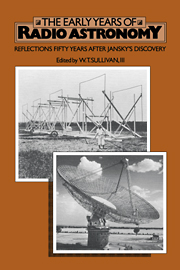Summary
The development of radar in England was perhaps the greatest technological contribution to the survival of that nation during the darkest days of World War II. This was achieved by concentrating the very best of British physicists in a few key laboratories (in particular the Telecommunications Research Establishment) where for six years they worked under tremendous pressure, often involving combat testing of the latest radar gear. Bernard Lovell and Martin Ryle emerged from this crucible not only as experts in radio techniques, but as men who knew how to get a job done. They founded radio groups at Manchester and Cambridge Universities amidst auspicious conditions for scientific and technical success: skilled and enthusiastic teams largely composed of wartime colleagues, “connections” to the military invaluable for obtaining surplus equipment, strong support from mentors (P.M.S. Blackett and J.A. Ratcliffe), and a subject ripe for exploitation.
The articles in this section recall those times. Jodrell Bank specialized at first in the radar study of meteors and the ionosphere, but shifted in the 1950s to pioneering work on galaxies and discrete sources. Large paraboloids and long baseline interferometry became specialties. At Cambridge, the Cavendish Laboratory group initially concentrated on solar observations, but then broadened to include the new and mysterious “radio stars.” Their relentless pursuit of the techniques of interferometry and the cataloguing, mapping, and interpretation of radio sources led to a variety of fundamental contributions.
- Type
- Chapter
- Information
- The Early Years of Radio AstronomyReflections Fifty Years after Jansky's Discovery, pp. 191 - 192Publisher: Cambridge University PressPrint publication year: 1984



